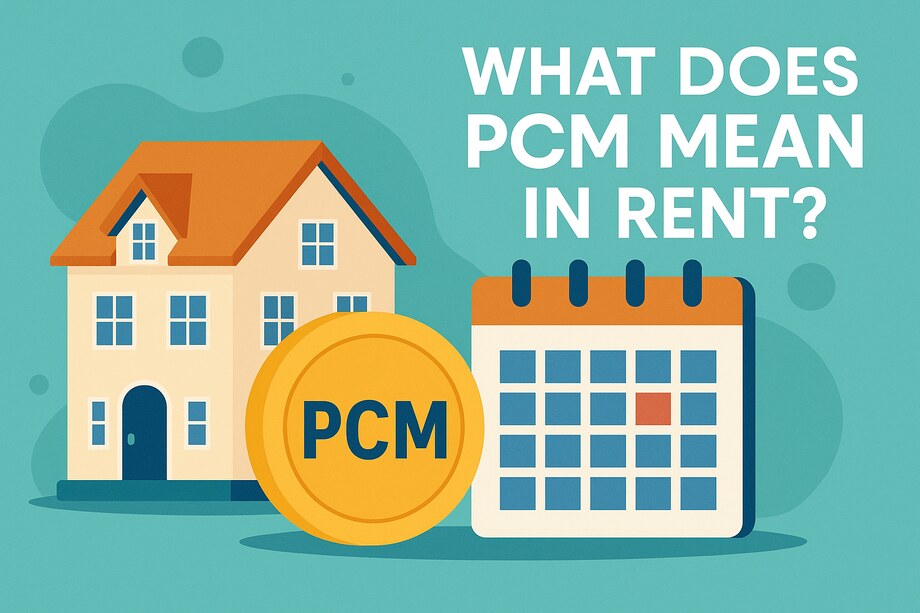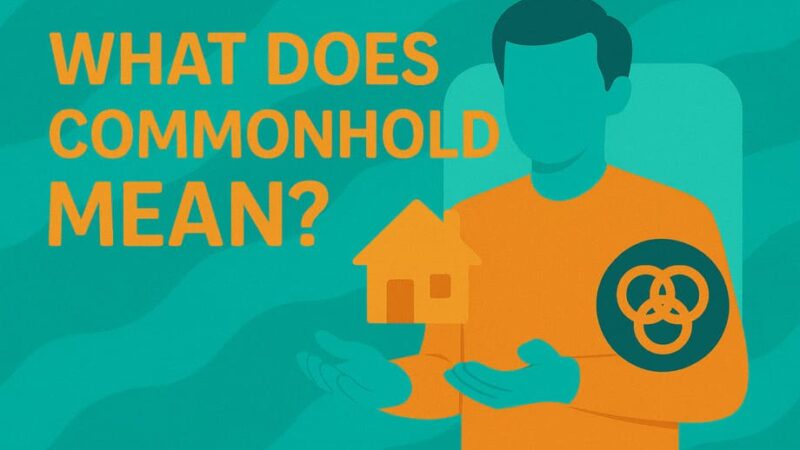What Does PCM Mean in Rent? – UK 2025 Guide

PCM in rent means “Per Calendar Month.” It shows the monthly rental cost of a property in the UK. For example, £1,200 PCM means you’ll pay £1,200 every month, regardless of whether the month has 28, 30, or 31 days.
PCM is the most common way rent is advertised in the UK, especially for long-term lets. In this guide, we’ll explain exactly what PCM means, how it’s calculated, how it compares to PW (per week), and what factors influence PCM rent across the country.
| Term | Meaning | Common Use |
|---|---|---|
| PCM | Per Calendar Month – rent is quoted monthly. | Standard residential lettings. |
| PW | Per Week – rent is quoted weekly. | Student lets, HMOs, short-term. |
| PPPW | Per Person Per Week. | Student accommodation. |
| PA | Per Annum – yearly rent. | Commercial or long-term tenancy. |
What Does PCM Mean in Rent?
PCM stands for Per Calendar Month. This term appears in rental agreements and property listings throughout the UK, indicating the monthly rent amount that tenants must pay to their landlord each calendar month. With PCM, tenants pay a consistent, fixed rental amount every month, regardless of whether the month has 28, 30, or 31 days.
This system benefits tenants by providing consistency and predictability. Whether you’re paying rent in February with its shorter duration or in January with 31 days, your rental payment remains exactly the same. This stability makes it much easier for tenants to budget their monthly expenses, ensuring they can plan and allocate the correct amount each month without surprises.
How PCM Rent is Calculated
The calculation for PCM rent is straightforward and simple to understand. When rent is quoted on an annual basis, you simply divide the total annual amount by 12 to determine the PCM figure. For instance, if the annual rent is £21,600, you divide this amount by 12:
£21,600 ÷ 12 = £1,800 PCM
Alternatively, if you encounter rent quoted on a weekly basis, you need to convert it to a monthly figure. This is easily done by multiplying the weekly rent by 52 (representing the total weeks in a year) and then dividing by 12 to calculate the PCM. For example, if the weekly rent is £300, the calculation works as follows:
Weekly to Monthly Rent
Weekly to Monthly Rent Conversion
UK rental conversion reference table
Example: £200 weekly × 52 ÷ 12 = £867 monthly
| Weekly Rent (PW) | Monthly Rent (PCM) |
|---|
£300 × 52 = £15,600 (annual rent) £15,600 ÷ 12 = £1,300 PCM
This conversion method proves particularly valuable when comparing properties that are advertised using weekly rates, which remains a common practice in certain areas across the UK.
PCM vs PW (Per Week) Rent – Understanding the Key Differences
When browsing property listings, you’ll encounter two main pricing structures: PCM (Per Calendar Month) and PW (Per Week). Both approaches have their advantages, but understanding the distinction between them is important for making informed decisions.
PCM (Per Calendar Month): As discussed, this represents the most common pricing structure throughout the UK and offers consistency for tenants who prefer predictable monthly payments. It’s especially well-suited for long-term tenancies, making monthly budgeting much more manageable and straightforward.
PW (Per Week): Some property listings, particularly in major cities such as London, advertise properties using a PW rate. While this might appeal to tenants who receive weekly wages, it’s crucial to remember that weekly rent calculations don’t account for months containing five weeks, making PCM a more reliable option for consistent budgeting.
To convert PW rent to PCM, simply apply the formula mentioned previously, multiplying by 52 weeks and dividing by 12 months. This conversion enables accurate comparisons between properties priced using weekly versus monthly structures.
To learn more about PW rent, see our full guide: What Does PW Mean in Rent?
Factors That Influence PCM Rent in the UK
Multiple factors determine PCM rent levels across the UK, ranging from location to property characteristics. Here are the primary factors you should consider:
Location: Properties in desirable locations such as central London, Birmingham, or Glasgow naturally command higher PCM rents. Areas offering excellent transport connections, outstanding schools, and convenient access to amenities typically result in increased rental costs. Conversely, properties in rural locations or those situated further from city centers generally feature lower PCM rates.
Property Size and Condition: Larger properties and those that are recently renovated or well-maintained will attract higher PCM rents. A three-bedroom apartment in a modern development will typically cost significantly more than a comparable property in an older, less updated building.
Amenities and Features: Properties offering additional benefits such as parking facilities, on-site fitness centers, or fully furnished interiors usually carry premium PCM rates. These conveniences increase property desirability, subsequently driving up rental costs.
Utility Arrangements: Whether utility bills are included within the PCM can vary considerably depending on the specific property. In shared accommodations such as HMOs (Houses in Multiple Occupation), landlords frequently include utilities within the rent. For other property types, tenants typically bear responsibility for utilities, which can substantially impact their total monthly housing expenses.
Why Understanding PCM is Essential for UK Tenants
Comprehending PCM is vital for anyone renting property in the UK. This knowledge not only helps tenants create more effective budgets but also provides clarity when comparing different rental options. Furthermore, by understanding how PCM functions, tenants can prevent potential misunderstandings with landlords and estate agents concerning rent payment arrangements.
For tenants, PCM provides significant advantages through stability and predictability. Knowing that your rent remains constant each month enables superior financial planning, particularly when combined with other monthly obligations such as utilities, internet services, and council tax. In contrast, tenants choosing weekly rent payments may experience fluctuations, especially during months with five weeks, resulting in higher-than-anticipated rental expenses.
Additional Considerations for PCM Rentals
When evaluating PCM rentals, remember to factor in costs beyond the base rent amount. Council tax, utility bills, and insurance typically represent additional monthly expenses that aren’t included in your PCM rate. Understanding these extra costs helps create a more accurate picture of your total monthly housing expenditure.
Different regions across the UK also show varying PCM rates, reflecting local market conditions, demand levels, and economic factors. Properties in London and the South East generally command the highest PCM rates, while Northern England and certain areas of Scotland and Wales may offer more affordable options.
If you’re comparing platforms, check out our Rightmove Alternatives guide.
What does PCM mean in rent?
PCM means “Per Calendar Month” and is the most common way rent is quoted in the UK.
How do you calculate PCM rent?
Divide annual rent by 12, or convert weekly rent using the formula: Weekly × 52 ÷ 12.
What’s the difference between PCM and PW?
PCM is monthly rent, PW is weekly rent. PCM is more common and easier for budgeting.
Is PCM rent cheaper than PW?
Not necessarily, it’s just a different way of quoting. Always convert to the same timeframe.
Making Informed Rental Decisions
Understanding PCM empowers UK tenants to make confident, well-informed decisions when searching for rental properties. This knowledge enables accurate budget planning, effective property comparisons, and successful negotiations with landlords or estate agents.
Whether you’re a first-time renter or an experienced tenant, grasping the fundamentals of PCM ensures you can navigate the UK rental market with confidence and clarity. Take time to research local PCM rates in your desired areas, factor in all additional costs, and use this knowledge to secure the best possible rental arrangement for your circumstances.
Need to convert between weekly and monthly rent? Use our weekly to monthly rent calculator to instantly see rental conversions with accurate UK calculations.
Ready to start your property search? Understanding PCM is your first step toward finding the perfect rental home that fits both your lifestyle and budget in today’s competitive UK housing market.
Last Updated on September 4, 2025 by James Cartwright







